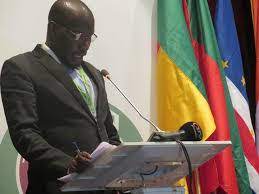
Held yesterday at the Paradise Suites Hotel in Kololi, the workshop looked at the draft Bill, which was a culmination of intense and sustained efforts aimed at identifying and addressing the technical compliance deficiencies in the country's AML/CFT legal framework, following the publication of The Gambia's 2nd Round of Mutual Evaluation report in June 2022.
The Bill provides a clearer and more comprehensive definition of Politically Exposed Persons (PEPs), which is in line with FATF Recommendation 12. It would ensure that risks associated with this class of high-risk individuals are adequately mitigated.
Alhagie Darboe, Director of FIU, said “the Bill is not merely a response to external scrutiny, but signifies a proactive step” towards strengthening their financial resilience, complying with international standards and ultimately consolidate the country's AML/CFT regime.
He highlighted some key aspects of the Bill, saying: “Moreover, the Bill will enhance our regulatory framework by addressing the challenges posed by Money or Value Transfer Service (MVTS) and emerging technologies, including Virtual Assets. This will, in addition to helping us comply with the requirements of FATF Recommendations 14 and 15, facilitate the effective management of the risks associated with these sectors.”
While the AML/CFT Act of 2012 provides a wide range of sanctions for breaches, he stated, no sanctions have been applied due to procedural limitations.
The Bill would enable the Financial Intelligence Unit (FIU) to enforce compliance without the need to secure a Court Order, he said, adding: “This will enhance the effectiveness of our sanctions regime, and additionally, the scope of administrative sanctions will be broadened to ensure that breaches pertaining to AML/CFT obligations are adequately penalised.”
He added that The Gambia’s commitment to combating money laundering and terrorist financing and all forms of financial crime “remains unwavering”. “Indeed, if the report of The Gambia's 2nd Round of Mutual Evaluation is to go by,” he pointed out, “the country would become the first country in the ECOWAS region to score a moderate rating of effectiveness in relation to confiscation and provisional measures.”
Siaka Bah, representative of the Central Bank of the Gambia (CBG), said the effective implementation of robust anti-money laundering and combating financing of terrorism and proliferation measures “remains a key priority” for all of them. “Strengthening the regulatory confidence that investors have in The Gambia is of paramount importance, as we aspire to become a recognised International Financial Centre,” he said, adding the CBG has continued to apply strong market entry requirements for financial institutions to ensure the integrity of the sector.
“The threat of money laundering and the financing of terrorism remains a pervasive challenge, because it legitimises illegal activities, undermines the integrity of our financial system, facilitates corruption, poses significant reputation risks, and makes crime profitable,” Mr Bah said. “When financial institutions are used by criminals or terrorists, it does not only tarnish the institution's reputation but also that of our entire country. This will jeopardise our international business relations and ultimately hamper economic growth.”
He added that the CBG has reiterated its commitment to collaborating with domestic and international authorities to effectively combat all forms of financial crimes and ensure The Gambia becomes a safe haven for investment.
“As we move forward, it is crucial that we maintain our collective commitment to implementing the provisions of this Bill effectively,” he urged, saying: “This will require continued collaboration, transparency, and vigilance. The Central Bank stands ready to provide the necessary support and guidance to all stakeholders especially the FIU as we embark on this important journey together. Let us acknowledge that the fight against money laundering and the financing of terrorism is not just a regulatory obligation, but a moral imperative. By validating and implementing this Bill, we are taking a decisive step towards creating a safer, more transparent and more prosperous Gambia.”
Amie Khan, representative of the Permanent Secretary at the Ministry of Finance, calls on all stakeholder institutions to fully commit to the implementation of the legislation when it is finally enacted.
The draft Anti-Money Laundering and Combating of Terrorist Financing Bill, 2024 includes provisions for domestic coordination and collaboration among Competent Authorities.
“It is imperative that these authorities make the best use of these provisions to enhance collective efforts in combating money laundering and terrorist financing,” she said. “Strengthening domestic coordination will facilitate more efficient information sharing, streamline enforcement efforts, and ultimately contribute to a more robust AML/CFT regime.”
She also told participants to do justice to the validation exercise, since their “expertise and insights are invaluable” as they strive to fine-tune the AML/CFT legislation to best serve the interests of the nation.
“As we embark on this journey, let us remain steadfast in our resolve to uphold the principles of justice, transparency, and integrity,” she advised, saying: “Together, we can build a future where our financial system serves as a bastion against illicit activities, ensuring prosperity and security for all our citizens.”




